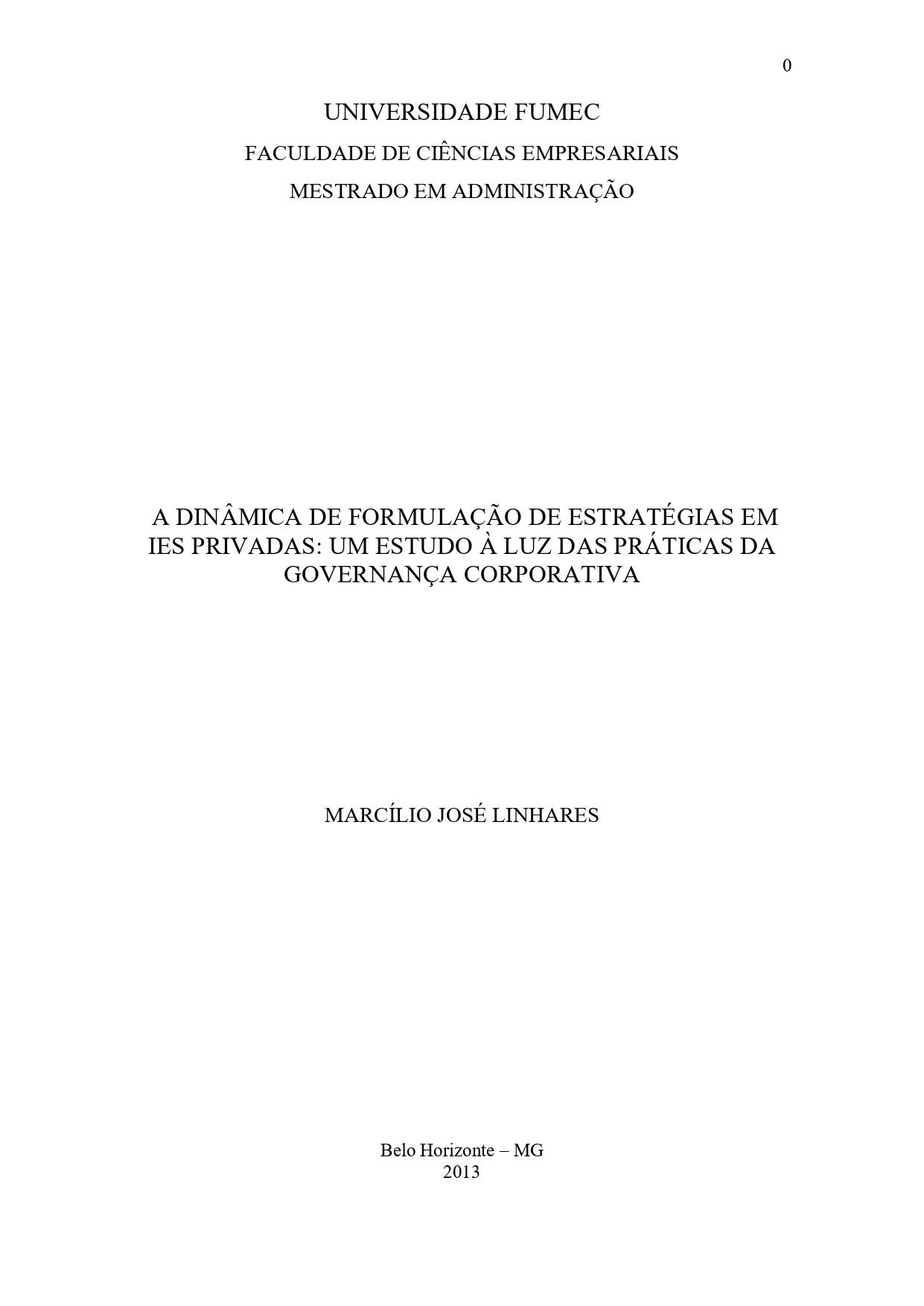A dinâmica de formulação de estratégias em IES privadas: um estudo a luz das práticas da governança corporativa

Visualizar/
Data
2013Autor
Linhares, Marcílio José
xmlui.mirage2.itemSummaryView.MetaData
Mostrar registro completoResumo
A análise do processo de formulação de estratégias nas organizações é um dos temas mais discutidos em Administração. Neste estudo, teve-se por objetivo verificar a dinâmica de formulação de estratégias organizacionais que se formam nas Instituições de Ensino Superior (IES) Privadas, à luz das práticas da governança corporativa. Para tanto, a partir de uma abordagem qualitativa, este estudo foi realizado em quatro IES privadas localizadas no estado de Minas Gerais. A análise da governança corporativa nesse cenário torna-se importante, devido ao seu objetivo de estabelecer o controle de interesses entre a entidade mantenedora e a entidade mantida. Suas práticas e estrutura devem especificar a distribuição de direitos e responsabilidades entre os diferentes participantes da empresa, como conselho de administração, diretoria, proprietários e stakeholders. Para a análise do processo de formulação de estratégias, este estudo baseou-se na tipologia das escolas de estratégias proposta por Mintzberg (1998). Os resultados apontaram que o processo de formulação de estratégias nas IES estudadas advém parcialmente da corrente teórica de maior influência sobre os gestores, por parte da entidade mantida, e, parcialmente, da entidade mantenedora. Apurou-se que a governança corporativa não está presente apenas nas relações de defesa de interesses e equilíbrio entre as partes (mantenedora e mantida), mas também no planejamento de metas e melhoria de processos de comunicação e transparência das informações para as partes interessadas e na formação e criação dos conselhos deliberativos e na estrutura administrativa das IES. Quanto à dinâmica de formulação das estratégias, apurou-se, para as IES estudadas, que as estratégias deliberadas têm origem, em sua maioria, na entidade que as mantém, enquanto as estratégias emergentes partem da parte mantida, que está diretamente em contato com as ações e os desafios cotidianos, além de pôr em prática os objetivos e metas deliberados pela entidade mantenedora. The analysis of the process of strategy formulation in organizations is one of the most discussed topics in management. This study was aimed to verify the dynamic formulation of organizational strategies that form in Higher Education Institutions (IES) Private, in the light of corporate governance practices. Therefore, from a qualitative approach, this study was conducted in four private institutions in the state of Minas Gerais. The analysis of corporate governance in this scenario becomes important due to their goal of establishing control of interests between the sponsor and the entity maintained. Its practices and structure must specify the distribution of rights and responsibilities among different participants in the company, such as board of directors, management, owners and stakeholders. For the analysis of the process of strategy formulation, this study was based on the typology of schools strategies proposed by Mintzberg (1998). The results showed that the process of strategy formulation in IES studied arises partially theoretical current of greater influence on managers, maintained by the entity, and, partially, the body maintains. It was found that corporate governance is not only present in the relations of advocacy and balance between the parties (sponsor and maintained), but also in planning goals and improving communication processes and transparency of information to stakeholders and training and creation of deliberative and administrative structure of the IES. As for the dynamic formulation of strategies, it was found to IES studied, deliberate strategies that originate mostly in the entity that holds them as emerging strategies depart from the maintained, which is directly in contact with the actions and daily challenges, and to implement the goals and objectives resolved by the entity maintains.
